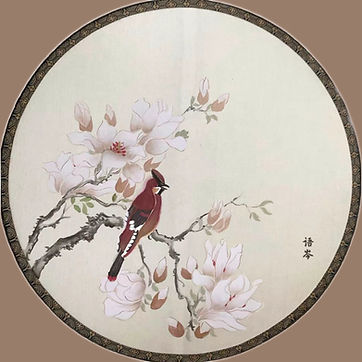
Pear Blossom and Bird
Cathy Shen, 2022
Chinese Traditional Painting
Theme: Flowers and Birds, Fan-Painting
Technique: Boneless (Mogu)
Material: Matured Silk

Magnolia Flower and Bird
Cathy Shen, 2023
Chinese Traditional Painting
Theme: Flowers and Birds, Fan-Painting
Technique: Boneless (Mogu)
Material: Matured Silk

Peach Blossom and Bird
Cathy Shen, 2022
Chinese Traditional Painting
Theme: Flowers and Birds, Fan-Painting
Technique: Boneless (Mogu)
Material: Matured Silk

Morning Glory
Cathy Shen, 2024
Chinese Traditional Painting
Theme: Flowers and Birds, Fan-Painting
Technique: Boneless (Mogu)
Material: Matured Silk

Peony Flower
Cathy Shen, 2023
Chinese Traditional Painting
Theme: Flowers and Birds, Fan-Painting
Technique: Boneless (Mogu)
Material: Matured Silk

Wisteria and Bird
Cathy Shen, 2024
Chinese Traditional Painting
Theme: Flowers and Birds, Fan-Painting
Technique: Boneless (Mogu)
Material: Matured Silk

Lavender
Cathy Shen, 2023
Chinese Traditional Painting
Theme: Flowers and Birds, Fan-Painting
Technique: Boneless (Mogu)
Material: Matured Silk
Fan Paintings: An Elegant Canvas of Chinese Art
Fan paintings represent a cherished genre within Chinese art, where throughout the centuries, artists and calligraphers have transformed the humble fan into an intimate canvas for artistic expression. These delicate surfaces became vehicles for personal sentiment, treasured as collectors' items or exchanged among friends as poetic keepsakes. Fans bearing calligraphy and paintings that remain in their original form are known as "complete fans." At the same time, those mounted as album leaves for easier preservation are simply referred to as "fan paintings." The art form encompasses two primary styles: the round "palace fan" and the collapsible folding fan.
Historically, this art form boasts a venerable heritage in Chinese culture. During the Song and Yuan dynasties, round fan paintings flourished as the preferred format. From the Ming dynasty onward, however, folding fan paintings rose to prominence and have since dominated the tradition.
The first painting of mine showcases traditional fan-painting in Chinese art. This piece of work primarily features several clusters of peach blossoms and a bird about to peck the flowers. I deliberately employed the principle of asymmetrical balance: the bird occupies the left-center portion of the circle, while the flowering branches extend diagonally across the surface, creating an imbalance from lower left to upper right. This diagonal arrangement prevents the round format from feeling static. At the same time, the space provides visual breathing room—an application of the Chinese aesthetic concept of "leaving blank" (liubai). Just like other conventional paintings, fan paintings involve various alterations in terms of the texture of the fan. For this painting, I chose the silk fan and applied the “fen ran” technique to create a gradually diminishing peony shade on the petals of the peach blossoms, starting from the center towards the peripheral area. The center was marked with small red dots that added visual accent points.
This painting demonstrates the meticulous Mogu style, characterized by precise brushwork and careful attention to detail. The bird's plumage exhibits subtle gradations from the dark olive-green back to the pale yellow breast, with brushstrokes outlining individual feathers.
As for the overall mood, the soft yellow background creates a warm atmosphere that complements the gentle pink blossoms and the bird's yellow breast, cultivating a classical, contemplative mood. The dark decorative border, featuring geometric patterns, provides a formal frame.
Positioned on an ornate black stand with carved details, this piece represents the tradition of displaying fans as decorative art objects rather than functional items. The stand's design primarily suggests that it was intended as a decorative piece for interior use, reflecting the Chinese tradition of incorporating nature-inspired imagery into ordinary spaces.
Comparative Analysis of Six Fan Paintings
The following six fan paintings form a cohesive collection that showcases the bird-and-flower genre within the traditional Chinese fan painting. The collection presents diverse fan formats: a scalloped palace fan with hibiscus, a rounded rectangular form featuring apple blossoms, a square-cornered design with wisteria, and a rounded square with morning glories.
The paintings display varying approaches to the medium. The hibiscus fan shows bold color saturation with rich pinks and strong leaf definition, suggesting confident brushwork in the xieyi (freehand) style. The apple blossom piece employs softer washes and more delicate color transitions, characteristic of the gongbi (meticulous) technique. In the wisteria fan, I used a more restricted palette of blues and grays. The morning glory fan combines both approaches, with precise flower rendering alongside looser foliage treatment.
The collection showcases various perspectives on the fan as an object. Two pieces retain wooden handles, maintaining their identity as functional items elevated to the realm of art. The others are mounted for display, with stands or frames that transform them into purely decorative pieces. However, despite individual differences, these fans share fundamental qualities: the preference for asymmetrical balance, the integration of calligraphy and seal marks as compositional elements, and the use of negative space to create atmospheric depth. Each demonstrates the Chinese aesthetic principle of capturing the essence (shen) rather than the mere appearance of natural subjects. The consistent pairing of flora with fauna—whether bird or butterfly—reinforces the traditional theme of harmony between different natural elements.


